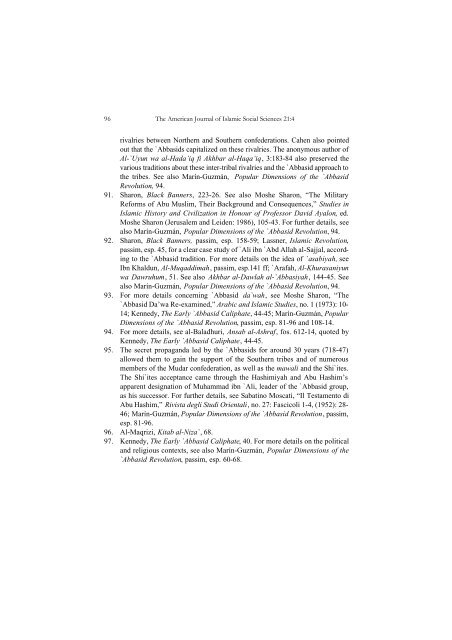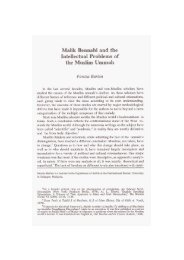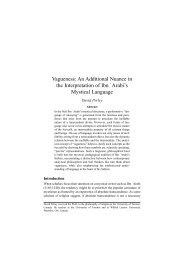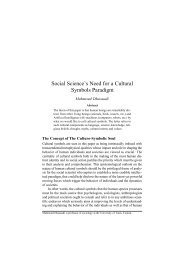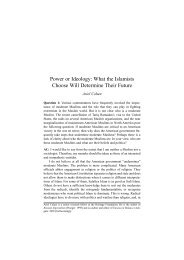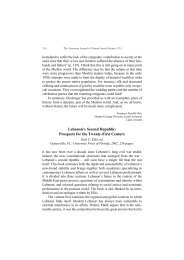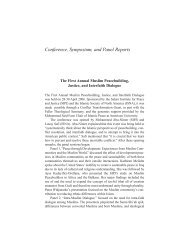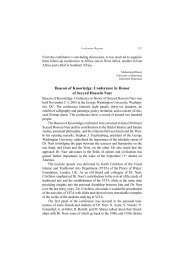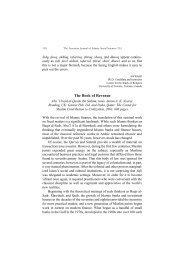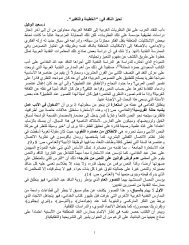Arab Tribes, the Umayyad Dynasty, and the `Abbasid ... - Epistemology
Arab Tribes, the Umayyad Dynasty, and the `Abbasid ... - Epistemology
Arab Tribes, the Umayyad Dynasty, and the `Abbasid ... - Epistemology
You also want an ePaper? Increase the reach of your titles
YUMPU automatically turns print PDFs into web optimized ePapers that Google loves.
96 The American Journal of Islamic Social Sciences 21:4<br />
rivalries between Nor<strong>the</strong>rn <strong>and</strong> Sou<strong>the</strong>rn confederations. Cahen also pointed<br />
out that <strong>the</strong> <strong>`Abbasid</strong>s capitalized on <strong>the</strong>se rivalries. The anonymous author of<br />
Al-`Uyun wa al-Hada’iq fi Akhbar al-Haqa’iq, 3:183-84 also preserved <strong>the</strong><br />
various traditions about <strong>the</strong>se inter-tribal rivalries <strong>and</strong> <strong>the</strong> <strong>`Abbasid</strong> approach to<br />
<strong>the</strong> tribes. See also Marín-Guzmán, Popular Dimensions of <strong>the</strong> <strong>`Abbasid</strong><br />
Revolution, 94.<br />
91. Sharon, Black Banners, 223-26. See also Moshe Sharon, “The Military<br />
Reforms of Abu Muslim, Their Background <strong>and</strong> Consequences,” Studies in<br />
Islamic History <strong>and</strong> Civilization in Honour of Professor David Ayalon, ed.<br />
Moshe Sharon (Jerusalem <strong>and</strong> Leiden: 1986), 105-43. For fur<strong>the</strong>r details, see<br />
also Marín-Guzmán, Popular Dimensions of <strong>the</strong> <strong>`Abbasid</strong> Revolution, 94.<br />
92. Sharon, Black Banners, passim, esp. 158-59; Lassner, Islamic Revolution,<br />
passim, esp. 45, for a clear case study of `Ali ibn `Abd Allah al-Sajjal, according<br />
to <strong>the</strong> <strong>`Abbasid</strong> tradition. For more details on <strong>the</strong> idea of `asabiyah, see<br />
Ibn Khaldun, Al-Muqaddimah, passim, esp.141 ff; `Arafah, Al-Khurasaniyun<br />
wa Dawruhum, 51. See also Akhbar al-Dawlah al-`Abbasiyah, 144-45. See<br />
also Marín-Guzmán, Popular Dimensions of <strong>the</strong> <strong>`Abbasid</strong> Revolution, 94.<br />
93. For more details concerning <strong>`Abbasid</strong> da`wah, see Moshe Sharon, “The<br />
<strong>`Abbasid</strong> Da’wa Re-examined,” <strong>Arab</strong>ic <strong>and</strong> Islamic Studies, no. 1 (1973): 10-<br />
14; Kennedy, The Early <strong>`Abbasid</strong> Caliphate, 44-45; Marín-Guzmán, Popular<br />
Dimensions of <strong>the</strong> <strong>`Abbasid</strong> Revolution, passim, esp. 81-96 <strong>and</strong> 108-14.<br />
94. For more details, see al-Baladhuri, Ansab al-Ashraf, fos. 612-14, quoted by<br />
Kennedy, The Early <strong>`Abbasid</strong> Caliphate, 44-45.<br />
95. The secret propag<strong>and</strong>a led by <strong>the</strong> <strong>`Abbasid</strong>s for around 30 years (718-47)<br />
allowed <strong>the</strong>m to gain <strong>the</strong> support of <strong>the</strong> Sou<strong>the</strong>rn tribes <strong>and</strong> of numerous<br />
members of <strong>the</strong> Mudar confederation, as well as <strong>the</strong> mawali <strong>and</strong> <strong>the</strong> Shi`ites.<br />
The Shi`ites acceptance came through <strong>the</strong> Hashimiyah <strong>and</strong> Abu Hashim’s<br />
apparent designation of Muhammad ibn `Ali, leader of <strong>the</strong> <strong>`Abbasid</strong> group,<br />
as his successor. For fur<strong>the</strong>r details, see Sabatino Moscati, “Il Testamento di<br />
Abu Hashim,” Rivista degli Studi Orientali, no. 27: Fascicoli 1-4, (1952): 28-<br />
46; Marín-Guzmán, Popular Dimensions of <strong>the</strong> <strong>`Abbasid</strong> Revolution, passim,<br />
esp. 81-96.<br />
96. Al-Maqrizi, Kitab al-Niza`, 68.<br />
97. Kennedy, The Early <strong>`Abbasid</strong> Caliphate, 40. For more details on <strong>the</strong> political<br />
<strong>and</strong> religious contexts, see also Marín-Guzmán, Popular Dimensions of <strong>the</strong><br />
<strong>`Abbasid</strong> Revolution, passim, esp. 60-68.


